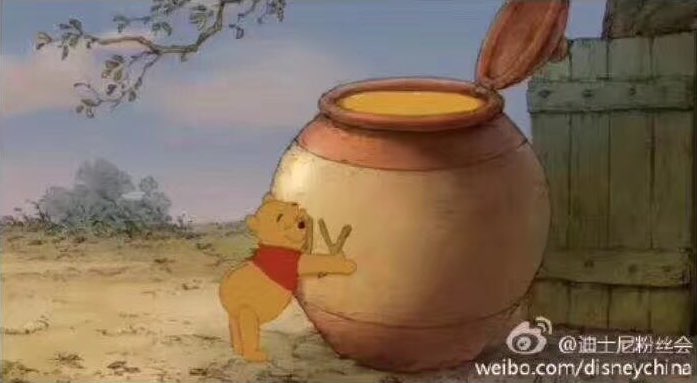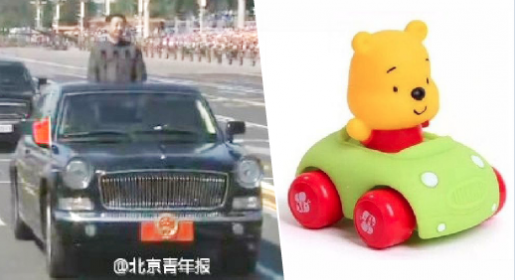‘Find the thing you love and stick with it’: Xi Jinping and the perfect meme

The Communist Party of China Central Committee proposed to remove the expression that the President and Vice-President of the People's Republic of China "shall serve no more than two consecutive terms" from the country's Constitution https://t.co/B849nuc2CJ pic.twitter.com/IbR7NNS9m2
— China Xinhua News (@XHNews) February 25, 2018
Chinese internet users, being internet users, had a bit of fun in 2013 on the occasion of Xi Jinping’s visit with then president Barack Obama, posting this picture to social media:
Of course it went viral, because it is almost too perfect. And of course it was censored, because of basically the same reason. As I wrote at that time, “If it doesn’t seem like a picture that compares China’s president to a chubby bear with a sweet tooth would be allowed to stand, it’s because a picture that compares China’s president to a chubby bear with a sweet tooth isn’t allowed to stand.”
Two years later, the following image became the “most censored photo of 2015,” according to Global Risk Insights:
As if Winnie the Pooh, A. A. Milne’s anthropomorphic devil-may-care giggling bear, were a virulent evil to be extirpated from Chinese cyberspace, censors nuked “Winnie the Pooh” as a search term from social media in 2017 ahead of the 19th Communist Party Congress, with Pooh-related GIFs also being removed from WeChat. Qiao Mu, a media professor at Beijing Foreign Studies University, was quoted by the Financial Times as saying at that time: “Historically, two things have been not allowed: political organizing and political action. But this year a third has been added to the list: talking about the president.”
Last night, no one could stop talking about the president. Surely you’ve heard. Xinhua dropped this bombshell just before 4 p.m. local time on Sunday, completely ruining the Winter Olympics closing ceremony for China-watchers everywhere:
The Communist Party of China Central Committee proposed to remove the expression that the President and Vice-President of the People’s Republic of China “shall serve no more than two consecutive terms” from the country’s Constitution.
The proposal would clear the way for Xi Jinping to stay for a third term (or more). He began his second term as China’s paramount leader, the General Secretary of the Communist Party of China, et al., in March 2017.
The response to this announcement, which we’ll cover more in depth this week, was overwhelming from both foreign and Chinese observers. Regular internet users within China, being who they are, also had something to say. The image at the top of this post began circulating on WeChat shortly after Xinhua’s announcement. It’s a Sina Weibo post made by the official Chinese account of Disney on September 2, 2013, depicting Pooh Bear hugging a gigantic vat of honey, captioned, “Find the thing you love and stick with it.”
Of course it is now censored, along with other terms in an expanding list:
Various terms relating to the end of two-term limit Xi Jinping as of now no longer searchable on Weibo. pic.twitter.com/TZSoduSytL
— Manya Koetse (@manyapan) February 25, 2018
This is how a harmless image takes on actual real-world significance, siphoning blood away from the CCP’s relevant organs. For each Pooh that must be dealt with, zapped to cybersmithereens, netizens are given impetus to create a new Pooh. I don’t want to overstate this, but memes in China are allowed to become their platonic ideal, puckish with a purpose, calling attention to something greater without grandstanding. Winnie the Pooh — a hunny-lovin’ fluff-stuffed humming frickin’ teddy — puts the lie to the notion that China is its governing body, that its body politic is in fine fettle, with all appendages in lockstep with the head. Sometimes the people want a different tune.
The other lesson to remember: Nothing dies on the internet. Like a certain bear, it hibernates. When it wakes, we’ll know why.









